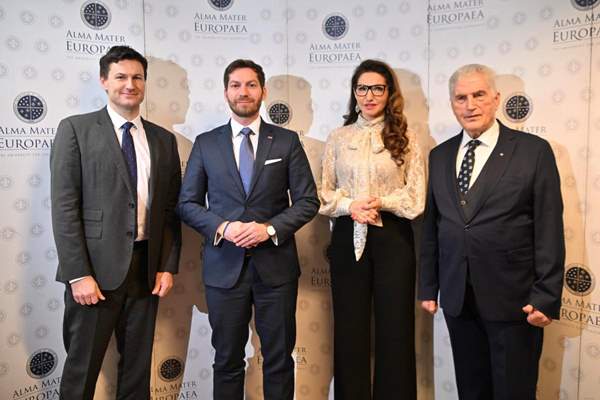
The It’s About People 2022 Conference has Started

The 10th annual international conference in Slovenia "It's About People" organized by Alma Mater Europaea and the European Academy of Sciences and Arts, this year dedicated to the challenges and solutions for digital transformation, successfully started today. The first day of the conference included several eminent speakers from a variety of academic fields.
"Digital transformation requires social and humanistic knowledge in order to establish a balance between rapid technological and social development and solidarity justice," said Prof. Dr. Ludvik Toplak, President of Alma Mater Europaea, one of the leading higher education institutions in Slovenia for digitalization and e-learning.
The conference It's About People 2022 is taking place under the auspices of the President of the Republic of Slovenia, Borut Pahor. "This year's meeting is taking place at a time when a large part of humanity is asking one question: Do we really not know how to resolve mutual disagreements other than through violence and even war. The changes that are taking place need to be accepted, understood and shaped for the benefit of society. For the benefit of the community! Development must go hand in hand with humanity and solidarity to enable the humanization of technology and inhibit dehumanization of society, "he added.
In the introductory part, the audience was also greeted by the Honorary President of the Academy of Sciences and Arts in Salzburg, Prof. Dr. Felix Unger, and Honorary President of the World Academy of Sciences and Arts, Prof. Dr. Ivo Šlaus. They both expressed the belief that the ethical challenges and opportunities for digital transformation are marking and changing the world we live in. "A Europe based on the principles of democracy and human rights in economic prosperity is currently experiencing one of the most dangerous challenges since World War II. We will survive this challenge with the help of independent digital transformation in environment-friendly innovations," highlighted the President of the European Academy of Sciences and Arts, Prof. Dr. Klaus Mainzer.
Vice-President of the European Commission Maroš Šefčovič spoke about life in the new post-industrial era: “Our world is changing rapidly. We see many mega trends happening around us, such as climate change, increasing pressure on democracy and values, demographic shifts and world order challenges posed by the horrific Russian invasion of Ukraine." Slovenia’s Minister for Digital Transformation, Mark Boris Andrijanič, pointed out that the digital inclusion of all parts of society is a priority task of the Government Office for Digital Transformation. "Ethical aspects of the digital transformation are at the forefront during the current war in Ukraine. I am happy that Europe will act in this field together with the establishment of the European Cyber Shield, "the Minister emphasized, adding that Slovenia had advanced on the European scale of digitalization last year.
 Mark Boris Andrijanič, Igor E. Bergant
Mark Boris Andrijanič, Igor E. Bergant
The Vice-President of the European Commission and Commissioner for Democracy and Demography Dubravka Šuica pointed out demographic changes, which are less visible and noticeable, but have a strong impact on people and society: “Given that aging affects our societies at various levels, the European Commission believes into an integrated approach that supports actions that cover several areas in a complementary way. We will present a new European care strategy to support men and women in finding the best care and life balance for them. "
The Dean of the Faculty of Law, University of Oxford, prof. dr. Mindy Chen-Wishart said “It’s much harder to see and address our own institutional and individual actions that perpetuate more subtle forms of racism that are outwardly inconspicuous.” She launched the #RaceMeToo movement last year and is calling on the society to listen to racial minorities. “It is difficult to trace racism, as there is a considerable amount of its denial. But punishment does not bring the right result because it separates and alienates people. " said Chen-Wishart.
The conference, which will last until March 18, 2022, will feature 60 panels and round tables with more than 250 speakers in the fields of health, medicine, social gerontology, social work, law, education, psychology, psychotherapy, communication, archiving, informatics, informatics, philosophy, and humanities. The conference is attended annually by world science leaders, professors from universities such as Harvard, Cambridge, Oxford, Columbia and others.
Alma Mater Europaea has 1,600 students in 28 study programs at doctoral, master's and undergraduate levels. It boasts the highest employability of graduates among universities and faculties in Slovenia. “All students participate in the conference. Doctoral students present their research, master's students prepare and publish reviews, and undergraduate students write summaries of papers, ”said dr. Sebastjan Kristovič, coordinator of the academic programmes.
The European Academy of Sciences and Arts is an association that connects over 2,000 scientists, including 33 Nobel Prize winners. The academy is based in Salzburg.
 Prof. Dr. Mindy Chen-Wishart, Prof. Dr. Jurij Toplak
Prof. Dr. Mindy Chen-Wishart, Prof. Dr. Jurij Toplak








